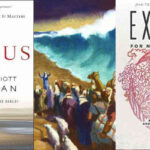I wasn’t raised in a Christian family, but I was sent to Sunday School, where I was taught Bible stories. I came to believe in Jesus when I was about 17.
As a young Christian, I was taught the Bible was God’s Word and without any mistakes. I was encouraged to read it every day, to underline important verses and to use Bible verses to guide my thinking.
I still read the Bible every day, but I have come to see it is as being a much more human book while still conveying God’s truth. And I have come to see that some very problematic sections in the Bible may not be God’s truths at all.
I thought an outline of my journey might be helpful to others who are also trying to make sense of the Bible.
Back then it was all very clear
I was taught that the Bible was the guide to my beliefs and my behaviour. I suppose most Christians back then were taught the same,. But I was in a strongly Bible-based Presbyterian Church and youth group that prided itself on its strong Biblical stance.
So Bible stories from Adam and Eve through to the Second Coming were believed quite literally. The Bible had answers to our questions about life. Our task was to read it, learn the lessons, and use it to guide our thinking.
I was a keen adherent to this teaching, an argumentative teen who could remember and quote verses. I read CS Lewis and other Christian authors as I sought to fill out my faith and understanding.
I also read books on doctrine, and by my late teens, I felt I had pretty much understood what I needed to know about Christian belief.
But it wasn’t long before that complacency was broken and my journey began.
Three questions that started it all
My journey started with three matters that challenged what I had been taught.
“Jesus wasn’t a very good evangelist”
Back in the early 1960s, evangelism was all about Billy Graham, who had completed a very successful crusade in Sydney in 1959. As a keen young Christian, I wanted to have Bible verses to support my attempts at evangelism, but I found all the verses I was compiling were in Paul’s letters, mostly Romans.
So I started searching in the gospels, but I couldn’t find much that supported that approach to evangelism. The thought crossed my mind: “Jesus wasn’t a very good evangelist.”
Of course I immediately knew that mustn’t be true, but it set me thinking. Why wasn’t the Jesus of the gospels evangelising like a good evangelical Protestant?
That question led me to Scottish theologian AM Hunter, whose book The Work and Words of Jesus was revolutionary to me. I began to understand Jesus as a first century Jew rather than through modern western eyes. His mission wasn’t only to die as an atonement, but was to establish the kingdom or rule of God on earth. He showed this through his teachings on the kingdom of God and how to live in it, and in his miracles which showed something of the hidden realities of the age to come.
And he left us with a mission to not just spread the word but to live it out in caring for others. He wasn’t just interested in the spiritual, but also in the social and physical.
This revelation has made all the difference to me. It makes my role in the world as a follower of Jesus much more interesting and worthwhile. And it puts to rest those old arguments about faith vs works – the kingdom of God encompasses both!
Two years in the Army
In my early twenties I was conscripted into the Australian army, to make up numbers to fight the foolish Vietnam war. I didn’t have to serve overseas, but the experience was formative – army discipline, the all-male environment, learning how to use weapons and the degrading, profane culture were all difficult for me.
I entered the army believing, as I’d been taught, that it was OK for Christians to kill in a “just war”, and that fighting communists in Vietnam was just. But I came out believing that Jesus meant what he said in the Sermon on the Mount that non-violence was God’s way. So I was close to a pacifist because I was convinced this was Jesus’ clear teaching.
The Canaanite genocide
Not long after I was discharged from the army we were leading a small group of church youth who met informally in our home for a meal and discussion. Someone asked about the commands attributed to God in the Old Testament to totally destroy tribes or cities.
I didn’t have an answer. Having just decided Jesus really meant us to love our enemies, I could hardly pretend that such commands were OK. And if God really wanted to kill those people, why ask his people to do his dirty work for him, in contravention of the Ten Commandments?
I simply had to put the question aside for the moment and admit I had no answer, except to say that my faith in Jesus was based on the New Testament. So if any part of the Old Testament presented a different picture of God than the one revealed in Jesus, then it was problematic and I would continue to trust the Gospels. It was decades until I found the answer.
I couldn’t unknow these things
Once I had found that what I had been taught as a young Christian was incomplete and sometimes quite doubtful, I couldn’t pretend I hadn’t learnt these things. And the door was open for me to unlearn and learn more.
Do your own research!
Life and faith throw up questions, doubts and difficulties all the time. So how to deal with them? I didn’t feel I could in all honesty ignore them, nor did I always believe the Christians around me had satisfactory answers. So I began to do my own ‘research’.
Word of God?
The Protestant/evangelical view of the Bible as without error is based largely on the view that it is “the Word of God”. I decided to research it, and found out the the phrase “Word of God” is never used in scripture to describe the Bible as a whole – how could it be when the Bible as a whole didn’t exist until long after the various books were written?
Instead I found the phrase was used in several different ways in scripture:
- In the Old Testament, it generally refers to a message from God to a prophet – part of the scripture but not the whole or even the majority.
- John calls Jesus “the Word” (John 1).
- In the rest of the New Testament, especially in Acts, “word of God” means the message about Jesus being spread by Paul and the other apostles.
Once we understand this usage, we are much freer to approach the Bible as it is rather than as dogma says it ought to be.
Interpreting the Old Testament
As I continued to read and study the Bible, I made a surprising discovery – when Jesus and the apostles quoted or referred to the Old Testament (their scriptures, the Tanakh), they didn’t always do it accurately or in context, as we would try to do today.
When I investigated this I discovered that about half the time they quoted accurately, but about half the time they changed words, omitted sections, changed meanings and interpreted out of context. So I looked to the experts, and found Richard Longenecker’s Biblical Exegesis in the Apostolic Period.
Longenecker explained that this wasn’t an accident or a mistake. First century Jews weren’t committed to literal interpretations, but were happy to use other methods which we would regard today as fanciful and illegitimate – often re-interpreting passages from their original meaning to point to Jesus (the famous Isaiah 7 quote about a young woman conceiving is a clear example), and sometimes using Rabbinical “rules” that allowed new interpretations (e.g. if two different passages used the same word, the two could be linked to forge a new meaning).
This makes an amazing difference to how we read the Bible. We no longer have to literally believe that a rock accompanied the Israelites in the desert (1 Corinthians 10:3-5), or human beings are gods (John 10:35). And we can better interpret the Old Testament overall.
Old Testament prophecy
I was once taught that the fulfilment of Old Testament prophecy proved the divine origin of the scriptures. But when atheist friends challenged this conclusion, I checked it out.
I found that many of the prophecies were only partially fulfilled if interpreted literally. But if I accepted some statements as colourful language to make the main point, then the prophecies stood up to scrutiny much better.
So I learnt, again, that a literal interpretation of scripture creates problems whereas a more nuanced and culturally-aware interpetation hangs together and makes more sense.
Evolution
Evolution vs creation is a big issue for many Christians, but never really was for me. For many years I was suspicious of evolution – it just didn’t seem to make sense that complex life could evolve as claimed. But at the same time, my reading of the early chapters of Genesis left me with the clear impression that it wasn’t history, but more like a series of folk tales.
So I was agnostic and unfazed about evolution for decades. But when I finally did my research, I found the evidence for evolution was quite strong, especially the DNA evidence. So while I still find it somewhat amazing, I am happy to accept it as a true description of the process God used to put humans living on planet earth.
The big challenge was how to decide what truth there is in the Adam and Eve story, the Fall and Original Sin. The evidence (principally DNA) forced me to the conclusion that all these were part of the legendary nature of Genesis. I haven’t found that conclusion to be a difficulty, and the arguments against it seem to me to misunderstand the scriptures and Jewish religious culture.
The Holy Spirit and prayer
Jesus said the Holy Spirit would guide us into truth (John 14:17, 26; 15:26; 16:13), so I believed him. For a couple of years more than a decade ago I prayed regularly that God would guide me to a correct understanding of the Bible, especially the Old Testament.
It took a while, but eventually I felt he led me to certain books and certain ideas. The next part of my journey came from this …..
Apologetics and scholars
In the last two decades I have spent a lot of time interacting with atheists and doubting believers – writing blogs, answering comments, making comments on other blogs and forums and in email correspondence. This has required me to do a lot of reading on New Testament history, archaeology, philosophy, science and anthropology (all the time trying to get a balance of both Christian and non-believer views). I have learnt a lot.
New Testament history
New Testament historians like Richard Bauckham, John Dickson and NT Wright (Christians) and Maurice Casey, Bart Ehrman and EP Sanders (non-believers) have given me insights into Jesus in his time and culture that have helped me build upon the foundation laid by AM Hunter. Kenneth Bailey’s Jesus Through MIddle Eastern Eyes has been a standout gem.
All this reading has strengthened my faith in the general reliability of the Gospel accounts, despite a few problems. But I can’t help concluding that some of what is taught in churches is more a product of western dogma than Middle Eastern and Gospel reality.
Old Testament history & archaeology
Reading Old Testament archaeology and history books by William Dever, Richard Elliott Friedman and Peter Enns showed me:
- Archaeology and history tends to support the accounts of Israel after David, though not all the details.
- There is little external evidence to confirm or reject the stories of the patriarchs.
- But archaeology doesn’t support the first accounts where we have external evidence: the Exodus and the “conquest” of Canaan. Those accounts seem to be a mixture of history and polemics as later writers tried to justify their claims to the land and explain why God hadn’t saved them from conquest.
I concluded that the OT is a mixture of legend and history, just as CS Lewis observed 70 years ago. It isn’t so much a book written by God, but rather an account of how God led the Israelites from pagan beliefs to the ethical monotheism of the prophets. Many of the early beliefs are a stage on the journey, and corrected by the prophets and ultimately by Jesus.
This conclusion didn’t worry me too much, because:
- I trusted CS Lewis as a guide.
- My faith is in Jesus, not in the Old Testament, which doesn’t play any part in the reasons why I believe.
- I see no reason why God cannot use legend as well as history to teach us, just as he can use parables, poetry and visions.
- Not having to accept everything in the Old Testament as being from God eases the difficulties about the Canaanite genocide and other problematic teachings and events. I can see them as beliefs before God had completed the process of revealing truth to them.
And so now …
I feel like my understanding of the Bible is now more settled than it has been for decades. I read it every day, mostly the New Testament with a bias towards the Gospels and Acts, for I feel they best show God in action through Jesus and the Holy Spirit. I feel happy to believe:
- The gospels provide us with reliable information about Jesus, as the secular historians affirm. We can understand him to have announced the dawning reign of God in the world, with the invitation for us to think again and join him in seeing the kingdom of God gaining ground. There may be errors in the gospels, but they are not major.
- The New Testament letters provide us guidance on how to understand the good news and how to live it out. But we shouldn’t see it as inflexible rules, for we live in the age of the Spirit, not rules and law (Romans 7:6, 2 Corinthains 3:6).
- The Old Testament is a mix of history and legend, of the old pagan beliefs of the Israelites in Canaan, and the growing understandings of the prophets. It shows us God at work, preparing people for the coming of Jesus, and people responding (or not). We need to be careful with OT teachings for many may be obsolete, old covenant rather than new. But the OT contains the scriptures that Jesus knew and we can’t understand him without the OT.
- So the Bible, I believe, is inspired but still a human document. It contains our scriptures, which we can only properly interpret via the guidance of the Holy Spirit. It doesn’t worry me that it isn’t inerrant, for inerrancy isn’t necessary for it to give us knowledge that leads to faith, and doesn’t give us certainty of intepretation anyway.
Understood in that way, I love the Bible. I especially love the accounts of Jesus’ ministry and teachings for they reinforce my belief that he was and is the divine man who I have chosen to follow for most of my life. My commitment to him is no less than it was 60 years ago when I began the journey, though my perspective has changed dramatically.
The Bible and the Spirit help me to see him more clearly, love him more dearly and follow him more nearly day by day (mostly!).
Read more on this website
- CS Lewis on the Bible, history and myth. The Bible as a gradual, unfolding, revelation.
- Understand the Bible, save your faith. A way that fits the evidence and is faithful to Jesus.
- What the scholars tell us about the New Testament. A summary of consensus views.
- What the scholars tell us about the Old Testament. A summary of what may be middle of the various scholarly views.
- In what way is the Bible a special book? Is the Bible inspired by God? What does this mean?
Photo by Kelly.




